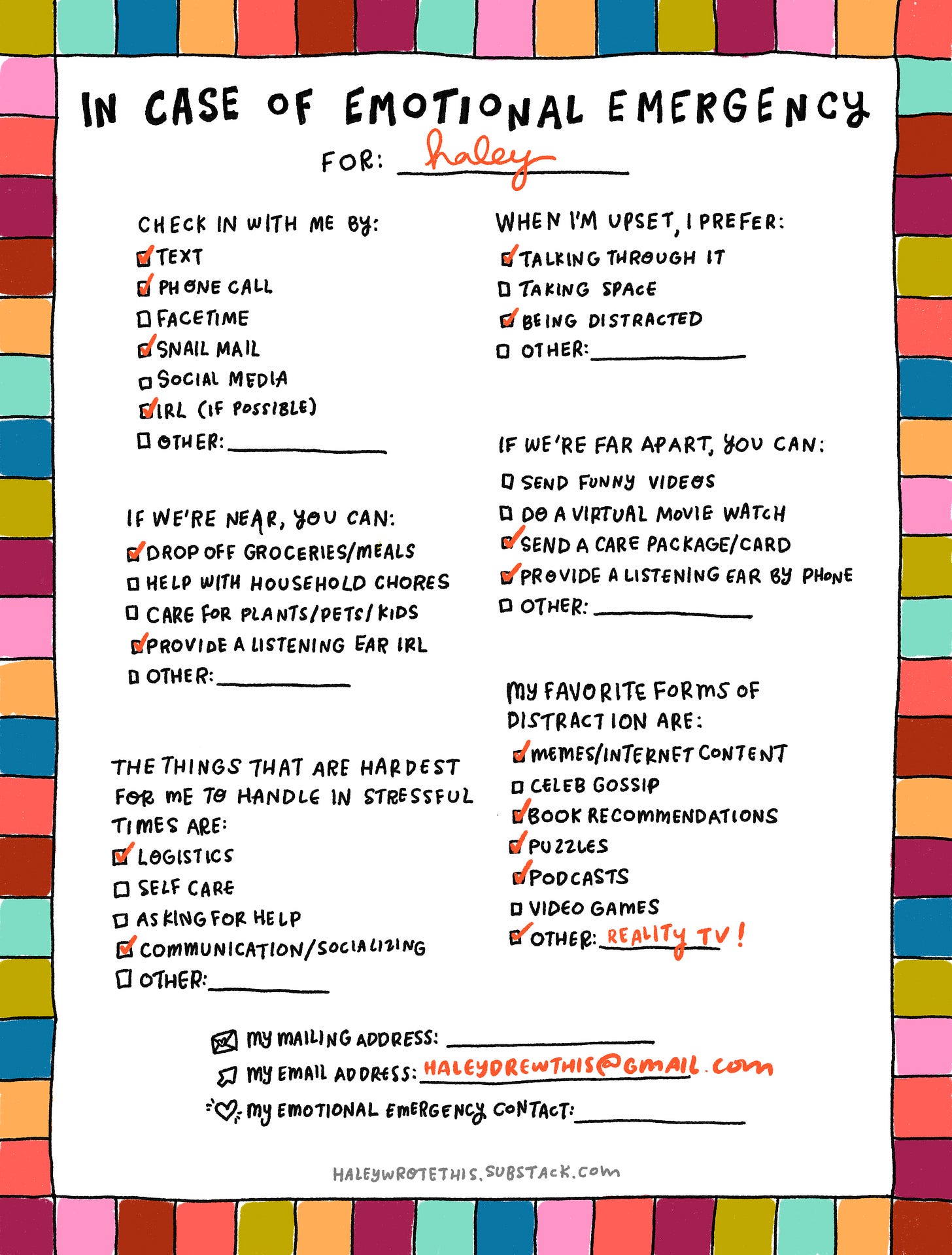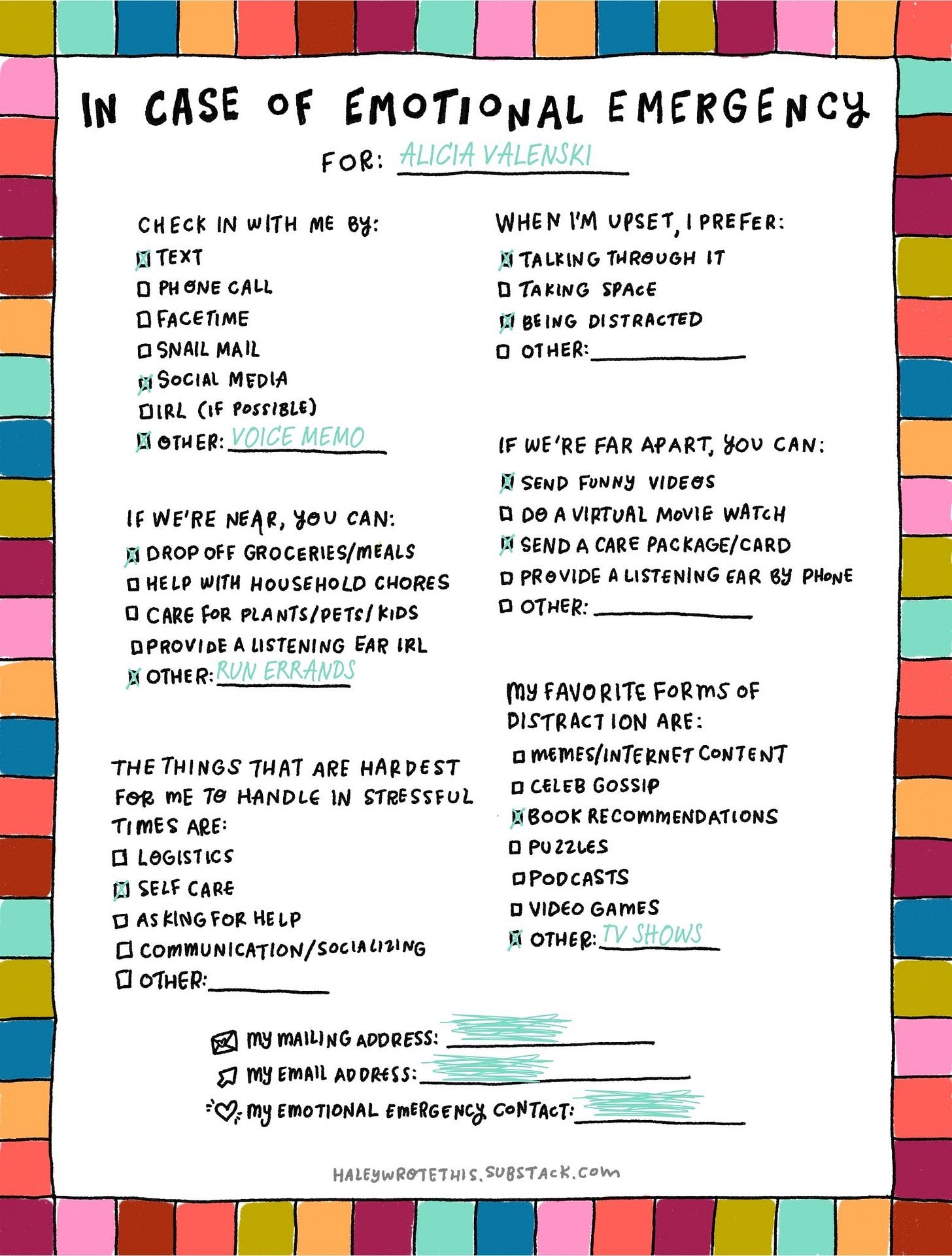#104: In Case of (Personal) Emergency
A brilliant way to care for your people
Two winters ago, I received an email from my friend Alicia.
I’d never heard of a Personal Emergency Guide (PEG) before. The concept, originally explained in this blog post, offers a space (usually a form) for loved ones to fill out how they’d like to be supported during a personal crisis.
I designed one so you can see what I mean:

It felt right that Alicia was the one to introduce me to PEGs. Our friendship began almost a decade ago when we were both hired as writers at the same marketing agency. We bonded over our absurd workloads and our anxious, people-pleasing tendencies. Alicia’s empathetic listening ear and emotional support kept me afloat through even the most challenging work days.
We stayed in touch after we both quit and later moved to new cities (me to Seattle, Alicia to Amsterdam), continuing to rely on one another as we took big leaps professionally and personally. And god it’s paid off. Alicia is less than a week away from the publication of her first book, The LGBTQ+ Travel Guide for Lonely Planet. She also writes about the ups, downs, and sideways adventures of being bisexual, neurodivergent, and an expat here on Substack:
All of that to say: Alicia has always championed vulnerability and unbridled support within her relationships, and a Personal Emergency Guide offers exactly that. Keep reading to learn about Alicia’s experience with PEGs, how she prefers to be cared for in an emotional crisis, and her thoughts on community care.
Q: Where did you first encounter the Personal Emergency Guide?
A: After she was laid off from her job, one of my good friends shared her personal emergency guide with me so I could offer her the kind of support she needed—and she encouraged me to fill one out for myself, too. The timing worked out well, as I ended up being laid off from my own job just a couple of weeks later, by which point she already had my completed PEG in hand.
Q: How does a PEG make showing up in a hard time easier?
A: When we're in crisis, it can be difficult to articulate what we need (or even to recognize that we need help at all). But when we’ve already had those conversations with our friends, we remove the guesswork and hesitation that often get in the way of support. Maybe for one person, it’s as simple as a text reminder to eat. For someone else, it’s knowing that a friend will stop by to take care of your pets or kiddos so you can catch a break, no questions asked.
Q: Why is community care so important?
A: Community care is essential because none of us are meant to go through life—or its hardest moments—alone. When we normalize sharing our needs and supporting each other in tangible ways, we create a safety net that catches us when we fall. A PEG isn’t just about asking for help; it’s about making it easier for the people who love us to show up for us when we need them the most, and the other way around.
In the end, community care isn’t just a nice idea, it’s a form of resilience. It reminds us that we’re held, even when everything feels like it’s falling apart. And in a world that so often pushes individualism, I really believe that choosing to care for each other is one of the most radical, beautiful things we can do.
Alicia’s book is available for preorder and will be officially out this Monday, March 18! Snag your copy here!
Thanks for reading! See y’all next week.










This is so good! It's a lot better than our default response, most of the time, which is the vague, "Let me know if I can do anything." A similar approach I really like is Brené Brown's question, "What does support look like right now?" This Guide answers that and more. Thank you for sharing this!
ugh you are the very best! I'm so glad to spread the word about how to be there for our community during such a weird scary time for so many of us, and so happy we have had/continue to have each other's backs after a decade (!) of friendship. I love this and I love you!